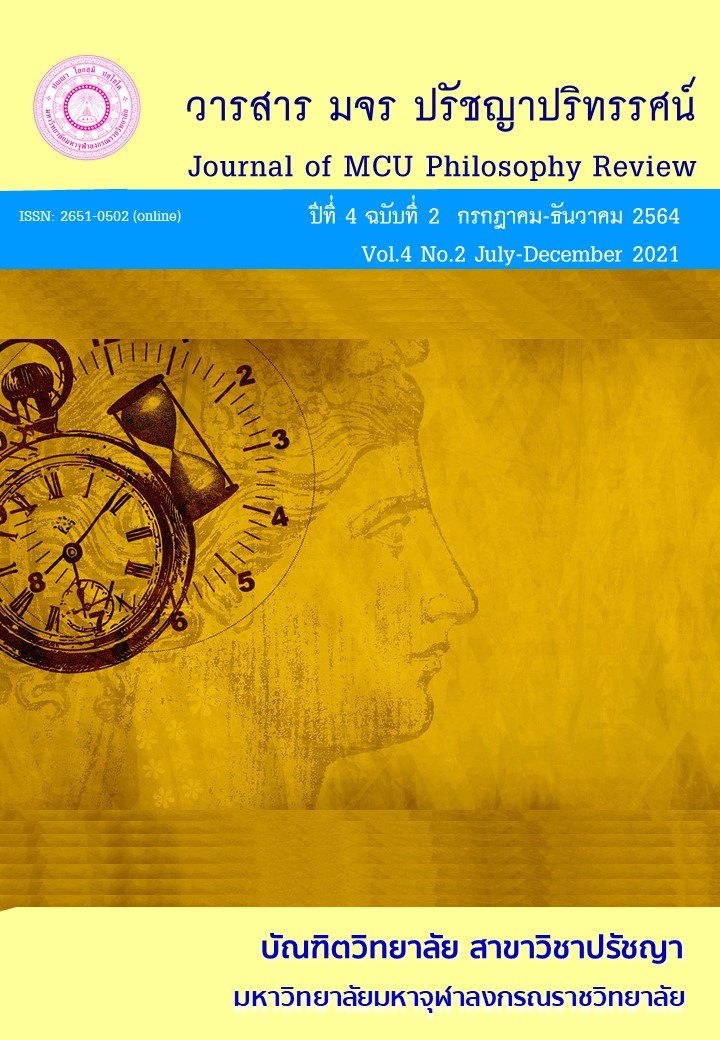The Concept of Autonomy and Anattā : An Analysis in the Viewpoint of Theravada Buddhist philosophy
Main Article Content
Abstract
In this paper, an attempt was purposely made to critically examine the concept of autonomy derived from western philosophy. Etymologically, the word ‘autonomy’ basically embraces the meaning that one is intentionally able to determine and choose the value one thinks good. When the mentioned concept is academically brought to be investigated in Theravada Buddhist contexts and then a question is asked that: is there any room for the examination of such a concept in Theravada Buddhist philosophy since the concept of Attã was obviously repudiated because if there is not Attã, then who else would be determined by one.
In this paper, it argued in favor of ‘yes’ on the grounds that: 1) such a concept means only the ability in determining oneself through the value one attaches to. Although it appears that the different meanings of the concept of self-concerning with autonomy being used by philosophical viewpoints to provide the basic definition are somehow emphasized. In fact, all viewpoints are of the sameness in its meanings, 2) the concept of Attã is denied by the principle of Anattã by Theravada Buddhist philosophy; it does not means that the usage of the word ‘Attã’ is also rejected, conventionally and rhetorically speaking, it stands for ‘oneself’ referring to agent’s action only, and 3) the examination of the concept of autonomy made by Theravada Buddhist philosophy is in the sense of the conventional meaning of Attã by which one is able to determine oneself through the value or virtue one thinks good to oneself resulting in certain action. Therefore, the concept autonomy is not contradictory to the concept of Anattã in Theravada Buddhist philosophy at all.
Article Details
บทความที่ได้รับการตีพิมพ์เป็นลิขสิทธิ์ของวารสาร มจร ปรัชญาปริทรรศน์
ข้อความในบทความที่ได้รับการตีพิมพ์ในวารสาร ถือเป็นความรับผิดชอบของผู้เขียนบทความ และข้อคิดเห็นนั้นไม่ถือว่าเป็นทัศนะและความรับผิดชอบของกองบรรณาธิการวารสาร มจร ปรัชญาปริทรรศน์
References
พระธรรมปิฎก (ป.อ.ปยุตฺโต). (2544). แก่นแท้ของพระพุทธศาสนา. กรุงเทพมหานคร: บริษัท ธรรมสาร จำกัด.
พระมหาพรชัย สิริวโร. (2559). พุทธจริยศาสตร์เป็นจริยศาสตร์ประเภทอันตวิทยาหรือกรณียธรรม. วารสารบัณฑิตศึกษาปริทรรศน์ 12(2), 49-63.
พระมหาพรชัย สิริวโร. (2562). พุทธจริยศาสตร์เป็นจริยศาสตร์ประเภทอันตวิทยาหรือกรณียธรรม. นนทบุรี: นิติธรรมการพิมพ์
พระมหาสมปอง มุทิโต. (2542). คัมภีร์อภิธานวรรณนา. กรุงเทพมหานคร: ธรรมสภา.
มหาจุฬาลงกรณราชวิทยาลัย. (2539). พระไตรปิฎกภาษาไทย ฉบับมหาจุฬาลงกรณราชวิทยาลัย. กรุงเทพมหานคร: โรงพิมพ์มหาจุฬาลงกรณราชวิทยาลัย.
มิลินทปัญหา. (2549). มิลินทปัญหา. กรุงเทพมหานคร: โสภณการพิมพ์.
อดิศักดิ์ ทองบุญ. (2546). ปรัชญาอินเดีย. พิมพ์ครั้งที่ ๓ กรุงเทพมหานคร : ราชบัณฑิตยสถาน
Charles Goodman. (2009). Consequences of Compassion: An Interpretation & Defense of Buddhist Ethics. New York: Oxford University Press.
David J. Kalupahana. (1995). Ethics in Early Buddhism. Honolulu: University of Hawaii Press.
Feinberg Joel. (1989). “Autonomy”. In The inner citadel: Essays on Individual Autonomy. ed. by Christman John. New York: Oxford University Press.
Garma C. C. Chang. (1986). The Buddhist Teaching of Totality: The Philosophy of Hwa- Yen Buddhism. University Park, PA: The Pennsylvania State University Press.
Gerald Dworkin. (1989). Theory and Practice of Autonomy. Cambridge: Cambridge University Press.
Harry Frankfurt. (1999). Necessity, Volition, and Love. Cambridge: Cambridge University Press.
Immanuel Kant. (2002), Groundwork of the Metaphysic of Morals. ed. and tr. by Allen W. Wood. New Haven, CT: Yale University Press.
Joerg Tuske.(2013) “The Non-Self Theory and Problems”. In A Companion to Buddhist Philosophy. ed. by Steven M. Emmanuel. London: John Wiley & Sons.
Theptawee Chokvasin. (2007). “Mobile Phone and Autonomy”. In Information Technology Ethics: Cultural Perspectives. eds by S. Hongladarom & C. Ess, Hershey PA: Idea Group.


